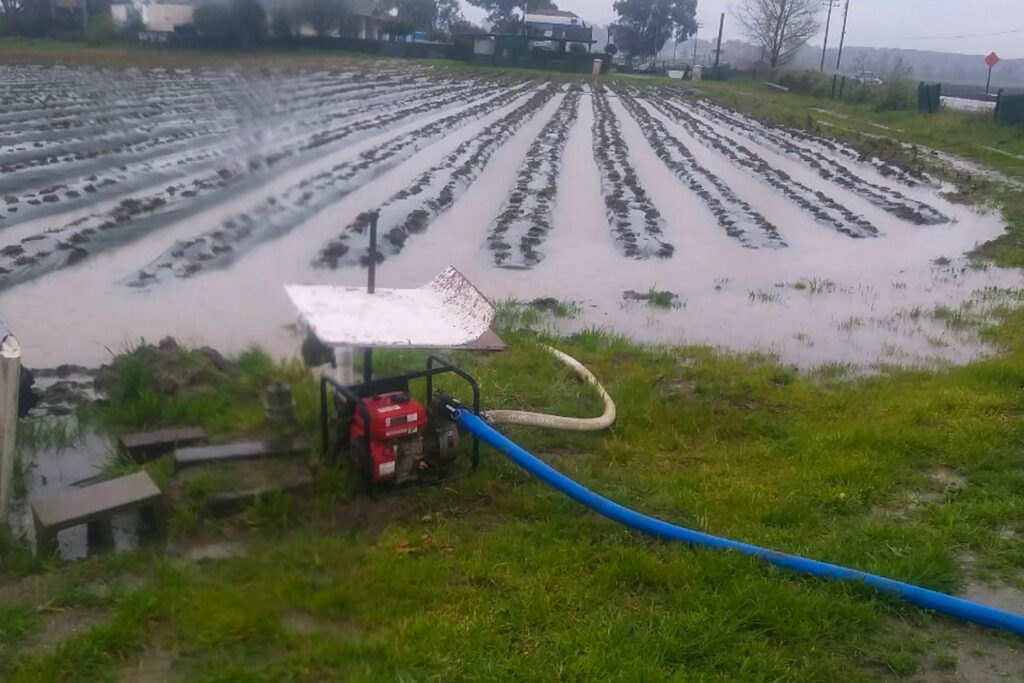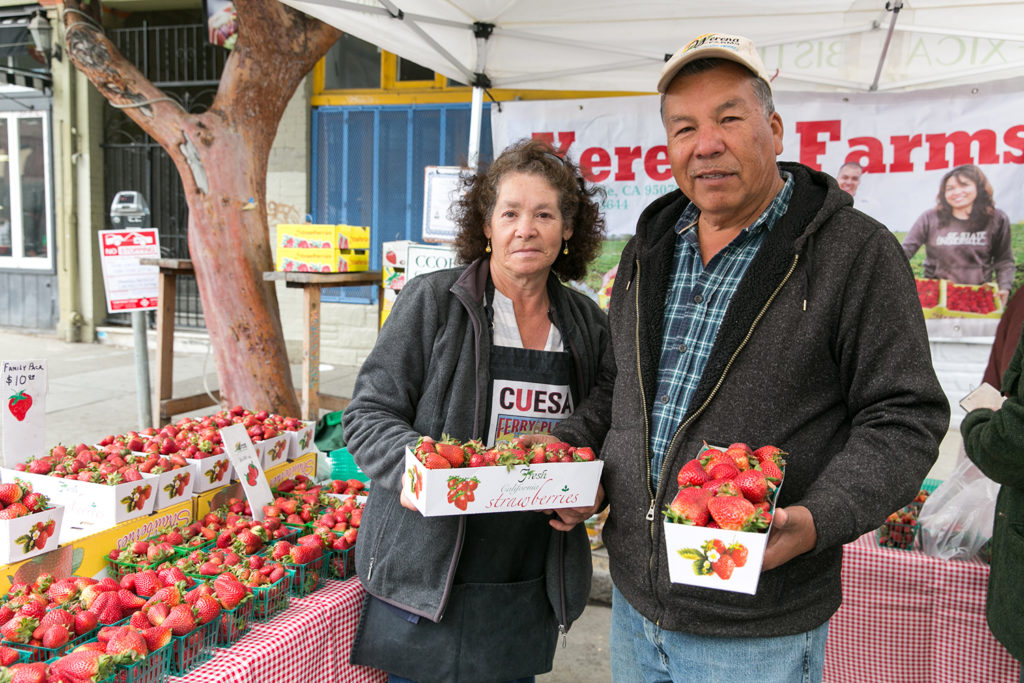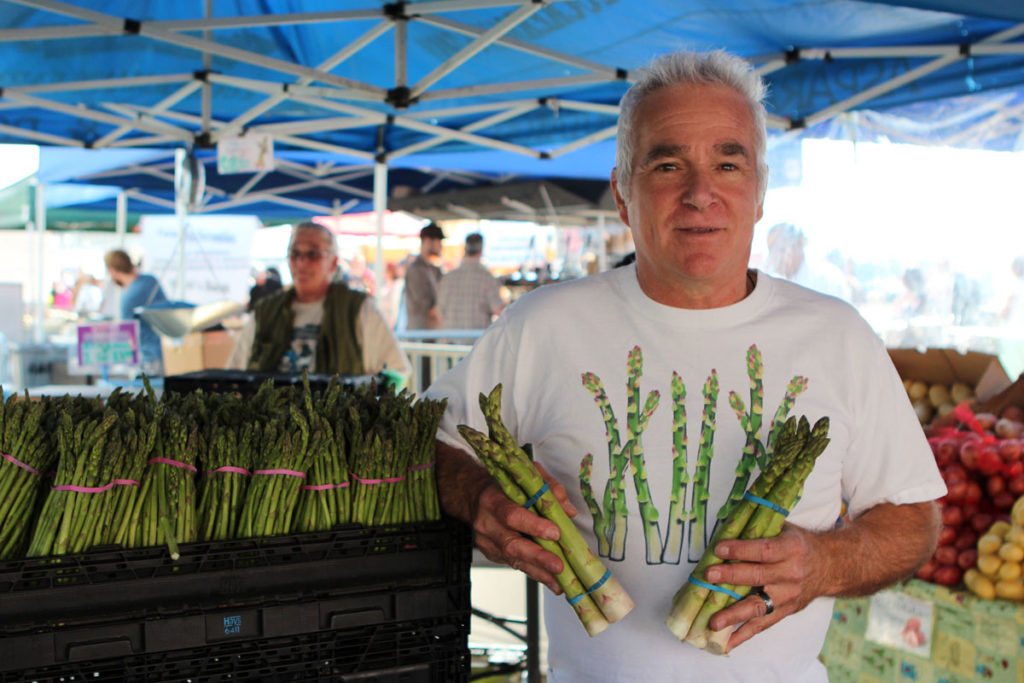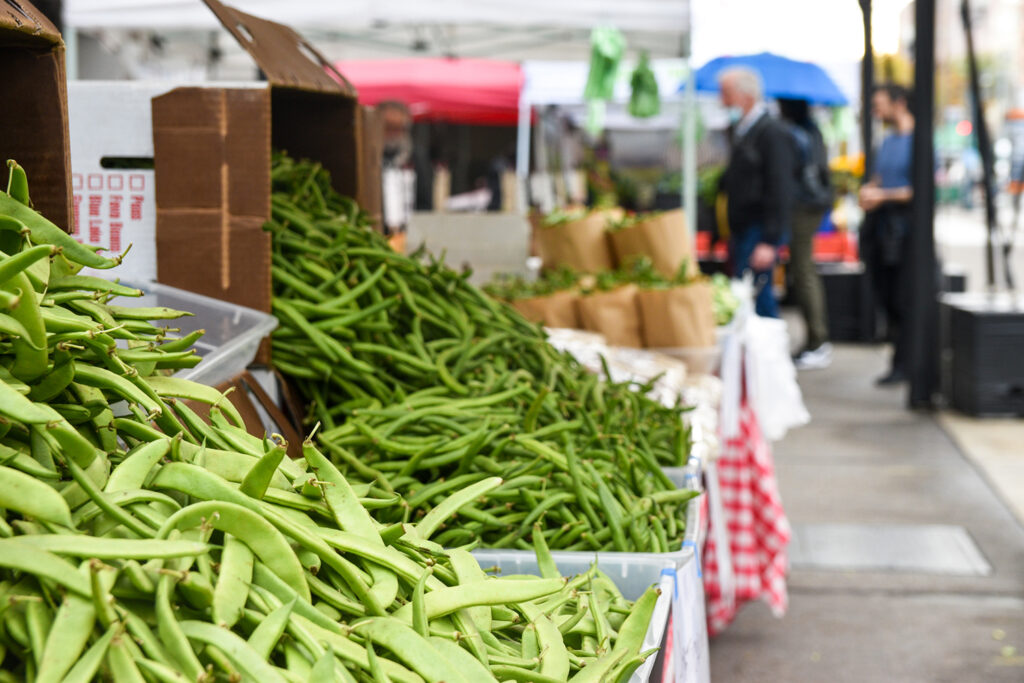Farmers Strained as Winter Storms Impact Spring Harvests
Selina Knowles, Communications Coordinator
March 17, 2023

Every morning, Poli Yerena starts his day by checking the water levels in his recently flooded fields on Yerena Farms in Watsonville, where he uses a water pump every day to protect rows of vulnerable strawberry plants. “We’re so far behind schedule,” says Poli. But he adds, “You have to be patient with Mother Nature.”
Since January, Poli and other farmers have been inundated with water, following several years of drought. Relentless rain, flooded fields, and shifting landscapes are impacting Northern California farmers’ land and operations, and the timeline of highly anticipated spring crops like strawberries, asparagus, and peas. Coming out of this winter wipeout, farmers hope to return to normalcy, recover from crop losses, and reunite with loyal farmers market shoppers in spring.

From Drought to Flood, Farmers Roll with the Atmospheric Punches
For Louis Iacopi, the non-stop downpour is shifting planting and harvesting plans on Iacopi Farms in coastal Half Moon Bay. He reports, “It just keeps on coming. It’s a wipeout. There’s no easy way to say it: everything’s underwater.”
In March, Iacopi Farms would usually be getting ready to bring their English peas to market, but not this year. “It’s drowned a lot of our crops. All our early peas and favas we’ve had to till under, crop, and replant. And they’re starting to drown, too. You don’t expect to keep getting this rain.” It will be two or three weeks before he knows whether or not these new plantings will survive.
He’s experiencing the same concerning loss with broccoli, cauliflower, chard, and kale. Unable to grow in such water-saturated soil, these plants are dying and leaving Louis with significantly less harvest than he anticipated.
The loss of crops and the flooding of fields impacts farmworkers, too. Louis says, “The workers have no work because it’s too wet to do anything. It affects their income, and it affects my income because I’ve got nothing to sell.”
Farmworkers aren’t the only ones benched by the wet weather. The rain also prevents bees from pollinating. Steven Kashiwase relies on these pollinators to support the growth of his orchard crops at Kashiwase Farms, inland in Winton. He says, “The almonds, the plums, the cherries, and the pluots need to be cross-pollinated, and with the rain and wind, bees don’t work.”

Expect Spring Crop Delays at the Farmers Market
This historic winter of atmospheric rivers and heavy rainfalls has put farmers behind schedule, compared to previous years. This means that the farmers market may look a little different than usual coming into spring.
“Farming is not for the faint of heart because you never know what conditions you’re going to have to deal with,” says Roscoe Zuckerman. On Zuckerman’s Farm in Stockton, the cold, rainy weather has shifted his schedule for harvesting asparagus, a much-awaited springtime favorite.
Roscoe says, “We’re hoping that within the next couple of weeks, it warms up enough [to get a good asparagus crop]. You need a certain amount of production to warrant the cost of harvesting and packing. That hasn’t happened yet.”
He’s eager to have asparagus to bring variety to Zuckerman’s farmers market stand. “Right now we’re living on our potato crop, basically,” he says. When the rain subsides and the soil warms up, he’s also gearing up to get summer crops growing, like zucchini and green beans. Meanwhile, his melons are safely starting indoors in greenhouses.
At Yerena Farms, Poli recalls that by this time in previous years, they were already picking berries. This year, however, they planted their earliest varieties a month later than usual, and he expects that it will be at least a couple more weeks before they’re ready to be harvested.
Of spring peas, Louis Iacopi says his crop is “99% wiped out. I am just hoping to get a few boxes to start, maybe in two to three weeks, of peas and favas.” Iacopi Farms still plans to bring a bit of all of their anticipated spring crops, but Louis expects that “our volume is going to be way down.”
On Kashiwase Farms, Steven is keeping a close eye on his orchard blossoms. Some years, he harvests an early peach varietal in April, but this year he says, “those have been affected too heavily.” He hopes to return to the farmers market with stone fruit around mid-May.

Farmers Depend on the Farmers Market Community, Rain or Shine
For experienced farmers, unexpected weather conditions can feel like business as usual. “My dad’s 83 years old,” says Louis, “We’ve been doing this forever. It’s not our first rodeo.”
Knowing that they cannot control the weather, farmers do the best they can to provide local communities with fresh, nutritious food at the farmers market, whatever the conditions. But due to decreased foot traffic on rainy days, market sales can often be only a fraction of what they would normally be on a sunny day, which hurts farmers’ bottom lines.
Farmers rely on regular customers showing up week after week, year round—even on those cold and wet winter days—to sustain their livelihoods.
“Having people love our peas and favas and having a lot of good customers at the market depend on us and love our crops, that helps. Because we’re doing it for them, and they’re buying it for us,” says Louis.
Support Iacopi Farms and Zuckerman’s Farms, rain or shine, at the Ferry Plaza Farmers Market on Saturdays. Stay tuned for when Kashiwase Farms and Yerena Farms will return to the farmers market, and find out their market days here.
Many local farmers have been impacted by the severe winter weather conditions. Find more ways to support farmers and farmworkers here.
Topics: Farmers, Farmers market, Farms, Weather
